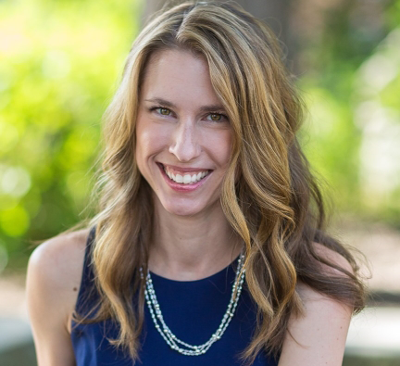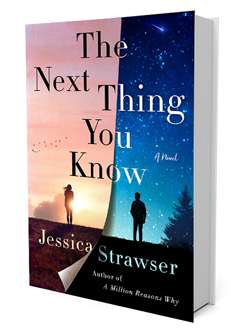Media of the Month – The Next Thing You Know
The Next Thing You Know
by Jessica Strawser
Jessica Strawser’s new novel, The Next Thing You Know, features an end-of-life doula as its main protagonist. For this book, released March 23 and selected as People magazine’s best new novel, Jessica dove into end-of-life doula research and drew on her findings. The fictional story follows doula Nova Huston and her client Mason Shaylor. In this excerpt from the first chapter, Mason makes his first visit to an end-of-life doula, meeting one of Nova’s colleagues.
Mason
THEN
Mason had already promised himself he wouldn’t make any decisions today.
He scuffed his Vans on the side porch of the old house, facing the office entrance, and told himself again: He was here only for the free consult. He didn’t need this. He’d been the one to make the call, and at any point he could unmake it. Bypass this extra step—no explanation necessary. A no-risk proposition.
Which left him no real reason not to go in and see what this so-called expert had to say.
This seemed a nice enough place. The porch was swept clean, its paint bright white even now, when the rest of Cincinnati had reached the gray-brown sludge stage of late February. A pink kid’s bike lay in the driveway, helmet discarded in the grass. The cold air carried faint hints of some pleasantly herbal smell awaiting him inside.
Signs of life.
He just couldn’t take his eyes off the actual sign. Hand-painted on wood, swinging slightly on its hinges. Parting Your Way, it read. End-of-Life Doulas.
He’d been doing a lot of pretending lately, but even he drew the line at acting nonchalant about walking through a door labeled End-of-Life.
What’s wrong with you? he asked himself. This is literally what you came to do. He kept waiting to feel more ready even as he suspected that no one ever did, and hell if that didn’t sum up the problem exactly.
Maybe he would have turned around, driven home wondering why he’d ever thought this would work. But the door swung open, and a woman in a long paisley dress filled the doorway.
“Mr. Shaylor?” she asked, smiling. He looked around for some feasible way to act lost, but he clearly wasn’t. He was right on time for his appointment.
“Mason,” he said quickly. More formality was the last thing this moment needed. “You’re . . . the death doula?”
She nodded, eyes flicking sideways to her sign, then back at him. Ah. She preferred end-of-life doula, but was too polite to say so. “Kelly Monroe.” She extended a hand, and he moved close enough for a brief shake.
He watched as she looked him over, her smile unwavering. He hadn’t bothered to clean himself up, seeing no point. But facing this bright-eyed woman, he had the belated decency to hope the smell of woodsmoke clinging to his down vest was enough to cover the stale beer and general misery permeating from the rest of him. He caught his reflection in the white-curtained office window: puffy eyes, sallow cheeks, ghost of a beard. He was thirty-six, but she’d easily guess him ten years older in this state.
Well, so what. Surely most people with reason to come here were at least this deprived of sleep and nutrition and especially luxuries. Like hope.
“Welcome. Shall we?” She stepped aside and gestured for him to come in.
He hesitated. At this angle, she blocked his view of the sign. Not that he could forget where he was, but he appreciated the symbolism being dialed down.
With a shrug, he stepped through.
Kelly’s office was large and warmly lit, the walls themselves seeming to glow. Her desk was tidy but not clinical: cozy, but not in a grandmotherly way. A contemporary quilt hung on the wall—simple patterns, subdued hues. French doors opened to a sitting area that bore more semblance to a living room than a waiting room, though it was clearly arranged for families needing a private word. On the far side of the suite, a pocket door stood open to a nook containing a daybed and rolls of yoga mats.
He turned to find Kelly beaming behind her violet cat-eye glasses. Clearly this was when visitors remarked on how lovely the space was, how positively full service.
He flopped into a leather armchair opposite the desk before he could lose his nerve.
Full service wasn’t what he was looking for.
“Coffee?” she asked.
Then again, maybe it was. He offered a sheepish smile. “Please? Black is fine.”
Kelly chose a gray-blue mug from the corner kitchenette and filled it from the carafe, which smelled fresh, even midafternoon. He accepted it wordlessly as she slid behind her desk.
“So,” she said. She folded her hands and inhaled slowly, making a point—or a show—of centering her attention on him. “What can you tell me about the situation you’re facing?”
Mason gestured toward the business cards arranged in a glazed clay dish. She’d named this place like a promise: Parting Your Way. “Isn’t everyone here kind of facing the same one?”
She exhaled, nodding calmly. “Yes and no. I’ve yet to encounter two that feel the same.”
There was that expectant look again. He took a long sip of the coffee, though it was piping hot, to keep from rolling his eyes.
“I was thinking more of timeline, prognosis,” she elaborated. “The immediate needs that bring you in. Whose behalf are you here for today?”
Now there was a question. Everyone’s, he wanted to say.
“I guess I looked at this consult as more informational. I don’t want to waste your time with my story if I’m not . . .” He cleared his throat. “Can we start with an overview? What exactly you do here?”
“No one is ever wasting my time with their story. But certainly.” She leaned back into her seat. “Would hospice be involved from the start?”
“No, not . . .” He cleared his throat again. “No.”
She nodded, pushing her eyeglasses higher onto her nose. “We can work collaboratively with them, of course, if and when the time comes. But for starters, then, my role would be as the client’s advocate and your family’s support as together you put a plan in place for a peaceful end-of-life transition. Families often come here overwhelmed with shock, sadness, fear, all of the above. My first step is to help stabilize that whirlwind of emotion.”
“How exactly?” He held the mug to his chin, hiding behind the steam.
“We doulas operate on the philosophy that there are five general aspects to achieving peace of mind as end of life nears. One, the physical: Beginning with a plan for where the client would like to be cared for and what would make that possible, all the way through to their bodily wishes for after they’re gone. The caveats here are that we do not provide medical care—legally, we can’t administer medication or anything of that nature—and we do not take the place of licensed funeral directors in any way. But preceding, during, and sometimes after death, we can be present and hands-on in other support roles tailored to the family’s needs—whether you need a shoulder to cry on or a spokesperson or an advocate. Make sense?”
He nodded. “Two,” she moved on, “financial: I can assist with getting any outstanding paperwork in order, everything from recording internet passwords to designating beneficiaries.”
“Isn’t that stuff you’d go to a lawyer for?”
She seemed to sense his skepticism, cocking her head to discern whether he really wanted to know or was playing devil’s advocate. Valid question: Even Mason wasn’t sure.
“To the extent that you require or prefer that expertise, absolutely. I can act as a liaison with professionals of your choosing or refer you to trusted providers. To be honest, thanks to the internet, you can take care of a lot without any professional at all. Many families find it helpful, though, to have an experienced point person who can help emotionally and logistically carry the burden, so you may be as fully present as possible for your loved one’s remaining days.”
“A point person,” he repeated. He couldn’t help but wonder at the sort of client who’d buy into this completely. He imagined she’d look a lot like Kelly herself.
“Well, aside from the overwhelm of filing legal paperwork and medical directives, these can be hot-button issues for families. What the client wants for themselves does not always align with what their loved ones want.”
Mason sat straighter. He and his family had never aligned. But they did seem to have reached a tipping point. Kelly picked up on his cue.
“Even with one another’s best interests at heart, people can find themselves butting heads at the time they most want to get along,” she said gently. “Emotions run hot. That’s where an objective third party familiar with this terrain can prove useful.”
She bit her lip, like she wanted to say more but thought it best to quit while ahead.
He had to admit, her instincts were pretty good.
“And you can do that?”
She nodded. “Even when caregivers and patients are on the same page, the situation can get away from them. For example, the lion’s share of terminally ill people say they want to die at home, but the stats on what actually happens don’t reflect that. Most take their last breaths in a hospital. It’s not always enough to proactively say what you want. Once enough doctors are involved . . . Sometimes you need to dig in your heels.” She smiled. “We doulas are good at that.”
 From The Next Thing You Know by Jessica Strawser. Copyright © 2022 by the author and reprinted by permission of St. Martin’s Publishing Group.
From The Next Thing You Know by Jessica Strawser. Copyright © 2022 by the author and reprinted by permission of St. Martin’s Publishing Group.

